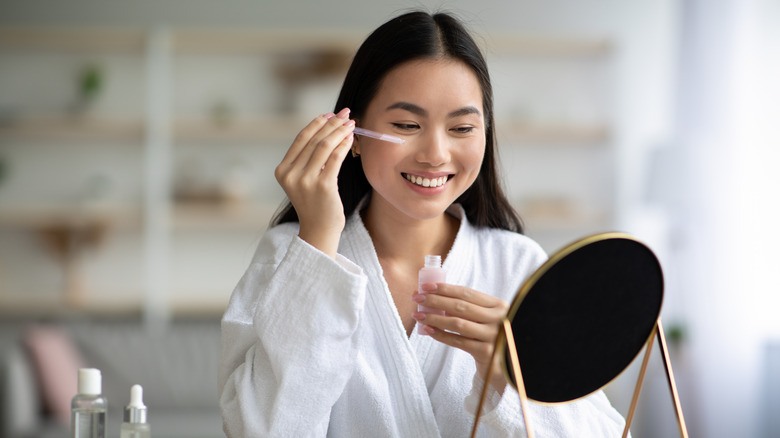Best Skincare Ingredients To Use With Niacinamide For Dry Skin
We may receive a commission on purchases made from links.
We're all a little obsessed with finding that one ingredient that'll take the beauty industry by storm, so it's no surprise just how much niacinamide has blown up. Exploding Topics verifies that it has become one of the most sought-after skincare ingredients on the internet, with its use in the beauty industry increasing by more than 220% since 2021. Thanks to social media, everyone is discovering the remarkable dermal benefits of this form of vitamin B3.
Niacinamide's popularity isn't by chance. It's a multi-beneficial product known for improving skin texture and tone while reducing sebum production, which helps to alleviate acne. It also fades dark spots and hyperpigmentation, all while soothing and reducing skin inflammation. Niacinamide is even more appealing because many individuals experience noticeable results after only several weeks of regular use.
If you're looking for a gentle ingredient that works well with other products and is rarely associated with allergies, this is it. However, when it comes to dry skin, there's an opportunity to enhance the benefits of niacinamide by combining it with complementary ingredients. To fully enjoy the benefits of niacinamide for dry skin, pair it with products that offset the cons and provide additional benefits.
Use niacinamide with aloe vera to offset dryness and fight acne
Nothing feels worse than itchy and tight skin, which often accompanies dehydration. While niacinamide fights acne efficiently, it also reduces sebum production — a drawback for dry skin, which already lacks enough sebum. This can potentially lead to more dryness. However, there's no need to abandon niacinamide altogether.
Instead, use niacinamide with aloe vera, a moisturizing and soothing ingredient. Aloe vera can combat dryness and provide much-needed relief from itchiness and irritation. What's even more remarkable is how well aloe vera complements niacinamide. While niacinamide reduces sebum production to combat acne, aloe vera's antibacterial properties come into play, helping to eliminate acne-causing bacteria. But that's not all. Both niacinamide and aloe vera have anti-inflammatory benefits, making them super effective for reducing inflammation faster.
Aloe vera also contributes to skin health by encouraging collagen production, improving skin elasticity, and effectively fighting wrinkles and sagging. This potent herb also contains traces of aloin, which can prevent hyperpigmentation and improve your skin tone. Skincare products like The Ordinary Aloe 2% + NAG 2% Solution can improve skin texture and fade post-acne marks while soothing your skin. Alternatively, aloe vera gel can come in handy for a wide variety of things, there are definitely a lot of amazing uses for aloe vera in your beauty routine.
Use niacinamide with hyaluronic acid to improve skin hydration and youthful appearance
Hyaluronic acid doesn't have the same acidic properties as other skincare acids, like AHAs and BHAs. Instead, it is a humectant that keeps the skin hydrated by attracting and retaining moisture from the environment. In simpler terms, hyaluronic acid and dry skin are a match made in heaven, especially if you have niacinamide in your routine.
Both niacinamide and hyaluronic acid stimulate collagen production in the skin, which helps prevent the formation of wrinkles and fine lines by improving the skin's elasticity. It's anti-aging properties extend beyond the face (don't forget how hyaluronic acid can take years off your neck). Niacinamide and hyaluronic acid also work together to enhance the skin barrier function, improving overall skin quality. Hyaluronic acid is soothing and particularly beneficial for alleviating discomfort caused by skin dryness.
To maximize the benefits of hyaluronic acid with niacinamide for dry skin, you can include it in your routine through a serum or moisturizer. We recommend using a rich moisturizer like Advanced Clinicals' dry skin moisturizer, which contains aloe vera. Another option is Neutrogena's Hydro Boost Hyaluronic Acid Serum, specifically designed for dry skin. If you choose to use a serum, remember to adhere to three basic rules: ensure compatibility between your active ingredients, use no more than two serums in a single routine, and allow each serum enough time to absorb into the skin before applying the next product.


